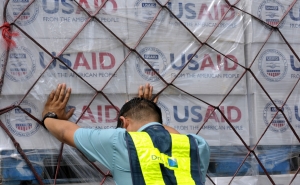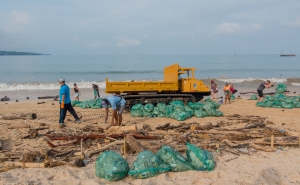As Global Health Programs Transition to Local Entities, Researchers Turn an Eye toward Sustainability

Programmatic transition, the process by which a public health program that is externally supported by donors is then transferred to local recipients for implementation and funding, is a topic that is growing in importance on the global health agenda. When done thoughtfully, programmatic transition has the potential to achieve domestic ownership of local health issues, mobilize resources, and maintain the success of the transitioning program. With funding from the Gates Foundation, researchers at the Johns Hopkins Bloomberg School of Public Health are examining what factors make programmatic transition successful, equitable, and sustainable.
Johns Hopkins is the recipient of a new $1.1 million grant from the India country office of the Gates Foundation and will work in collaboration with the Gates Foundation, the India Health Action Trust and the University of Manitoba to support the transition of a significant portfolio of reproductive, maternal, newborn, child, and adolescent health (RMNCAH) and health systems strengthening investments in Uttar Pradesh and Bihar, India. The new grant is called Framework and Tools to Inform Institutional Strengthening for Transition and Sustainability.
This work, led by Sara Bennett, PhD, professor in the Department of International Health at the Bloomberg School, will support the transition of the portfolio with the aim of ensuring sustainability by providing technical support and institutional strengthening. This will include stocktaking of the current organizational and programmatic landscape to support RMNCAH and health systems strengthening in both states, and working with partners on the development, implementation, monitoring, and evaluation phases of the transition.
It is common for public health programs in low- and lower-middle income countries to receive funding from donors such as multi-lateral international organizations, bilateral government agencies, and private philanthropic organizations. Frequently, such funding is complemented by technical assistance provided through international implementing partners. Accordingly, transition may need to take account not only of financial ramifications, but also build managerial and technical capacity, as well as local leadership.
“Successful programmatic transition should prioritize sustainability through developing the capacity of local organizations and through country-driven efforts,” says Bennett. “Strategies for the transition should be locally designed and be led by domestic partners that are closest to the community,” she emphasizes.
Researchers will apply lessons learned from prior studies and work on programmatic transition, including work for the Gates Foundation HIV program on achieving a sustained response to the HIV epidemic in Southern and Eastern Africa. Work on that project found that challenges to sustaining the HIV response included an emphasis on treatment over prevention, difficulty integrating HIV services within health systems, including challenges in ensuring coverage for marginalized populations affected by HIV, and, at times, waning political commitment. Researchers developed a set of recommendations based on the challenges faced, which include investing in primary prevention, providing operational support for integration processes, strengthening local organizations, and addressing issues of political will. Bennett is also drawing on some of these insights as a member of the United States President’s Emergency Plan for AIDS Relief (PEPFAR) Scientific Advisory Board’s Sustainability Advisory Group, which aims to provide independent, evidence-based input to support the sustainment of gains from the HIV response beyond 2030.
In addition to Bennett, other Johns Hopkins affiliates working on the project include Abigail Neel, MSPH ’18, a research associate II in the Department and a Bloomberg School DrPH candidate; Shreya Pereira, MSPH ‘13, a PhD student in the Department; Shalini Singh, an International Health faculty associate based at Johns Hopkins India; and Kriti Singh, PhD, senior program manager at Johns Hopkins India. As part of her dissertation, Neel is conducting ongoing scholarship to assess how growing bodies of literature on learning health systems and health system resilience may contribute to our understanding of sustainability, and to document stakeholder perspectives on issues related to donor transition and sustainability. Bennett and Neel also co-teach an annual short-term course on the topic that is offered every summer by the Global Health Systems Summer Institute in the Department of International Health’s Health Systems Program.





